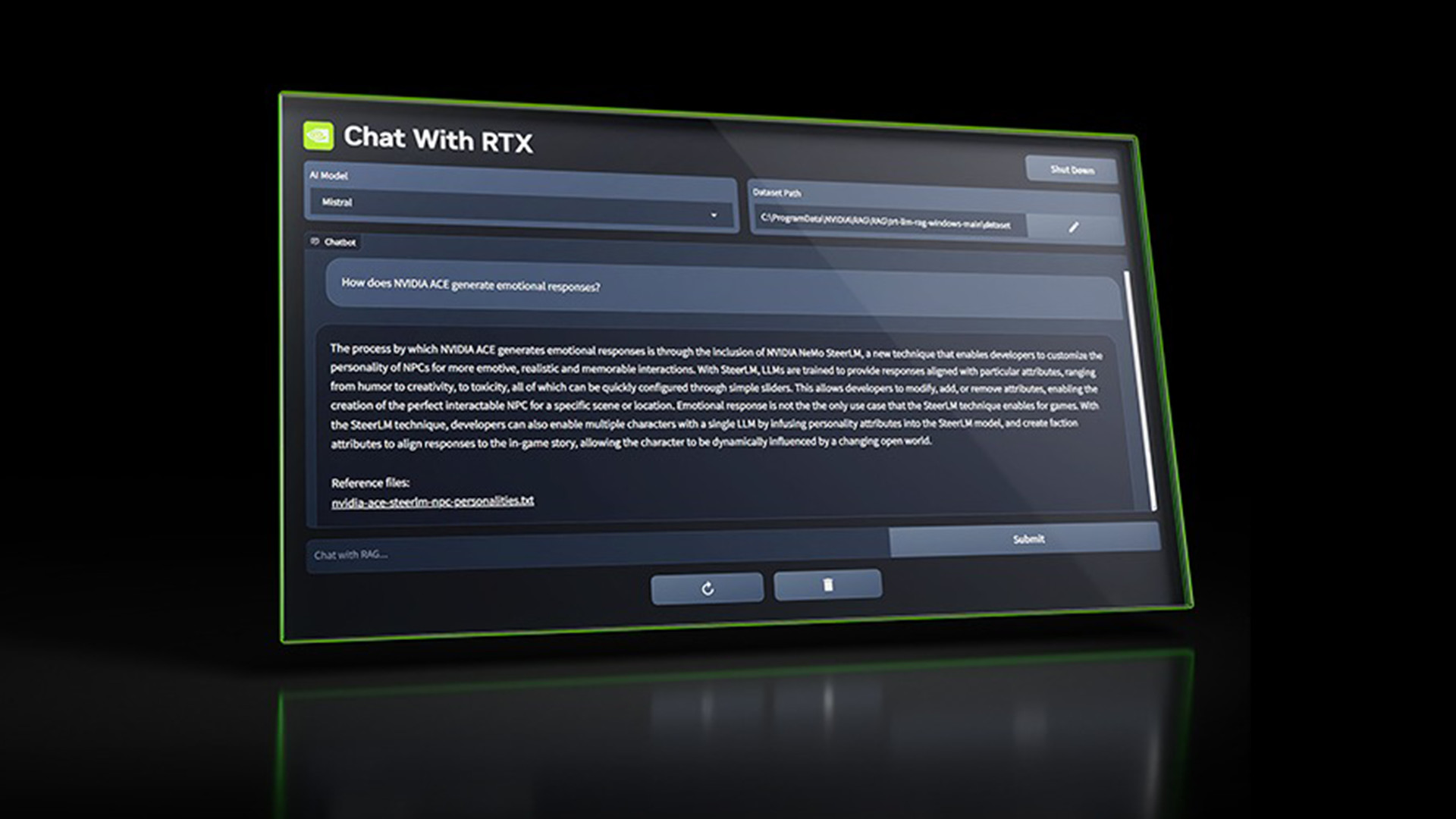Nvidia's new app will let you run an AI chatbot on your RTX-powered PC
Chat with RTX can sum up long documents and YouTube clips

Sign up for breaking news, reviews, opinion, top tech deals, and more.
You are now subscribed
Your newsletter sign-up was successful
Nvidia is offering users the opportunity to try out their new AI chatbot that runs natively on your PC called Chat with RTX.
Well, it’s not a chatbot in the traditional sense like ChatGPT. It’s more of an AI summarizer as Chat with RTX doesn’t come with its own knowledge base. The data it references has to come from documents that you provide. According to the company, their software supports multiple file formats including .txt, .pdf, .doc, and .xml. The way it works is you upload a single file or an entire folder onto Chat with RTX’s library. You then ask questions relating to the uploaded content or have it sum up the text into a bize-sized paragraph.
As TheVerge points out, the tool can help professionals analyze lengthy documents. And because it runs locally on your PC, you can ask Chat with RTX to process sensitive data without worrying about any potential leaks.
The software can also summarize YouTube videos. To do this, you’ll need to first change the dataset from Folder Path to YouTube URL then paste said URL of the clip into Chat with RTX. It’ll then transcribe the entire video for the app to use as its knowledge base. URLs for YouTube playlists can be pasted as well. You can also list out how many videos are in the playlist. Regardless, the software will transcribe everything as normal.
Rough around the edges
Keep in mind Chat with RTX is far from perfect. As TheVerge puts it, “the app is a little rough around the edges”.
It’s reportedly pretty good at summarizing documents since it had “no problem pulling out all the key information.” However, it falters with YouTube videos. The publication uploaded one of their clips for Chat with RTX to transcribe. After looking through the summary, they discovered it was for a completely different video. Additionally, it doesn’t understand context. If you ask a follow-up question “based on the context of a previous question,” the AI won’t know what you’re talking about. Each prompt must be treated as a completely new one.
Requirements
The demo is free for everyone to try out, although your computer must meet certain requirements. It needs to have a GeForce RTX 30 Series or higher graphics card running on the latest Nvidia drivers, at least 8GB of VRAM, and Windows 10 or Windows 11 on board.
Sign up for breaking news, reviews, opinion, top tech deals, and more.
TheVerge claims it took about 30 minutes for Chat with RTX to finish installing on their PC which housed an Intel Core i9-14900K CPU and a GeForce RTX 4090 GPU. So even if you have a powerful machine, it’ll still take a while. The file size for the app is nearly 40GB and will eat up around 3GB of RAM when activated.
We reached out to Nvidia asking if there are plans to expand support to RTX 20 Series graphics cards and when the final version will launch (assuming there is one). This story will be updated at a later time.
Until then, check out TechRadar's list of the best graphics cards for 2024.
Update 02-14-2024: A Nvidia representative got back to us stating they have nothing to share regarding GeForce RTX 20-Series support. As for future upgrades, they told us Chat with RTX will remain a tech demo for now, but they'll consider creating a final version if people really want it.
They go on to say that the demo was built on Nvidia's open source TensorRT-LLM RAG developer reference project which you can download from GitHub. If you're a developer and want to improve Chat with RTX using the Tensor project on your own, you're free to do so.
You might also like
- Nvidia was briefly more valuable than Amazon as AI hype spikes again
- Nvidia RTX 4080 Super is out of stock – is this GPU flying off shelves, or is there another reason behind it vanishing?
- AMD’s mid-range RDNA 4 GPUs are shaping up to be Nvidia RTX 4080 and 4060 Ti killers – but they may not arrive until 2025

Cesar Cadenas has been writing about the tech industry for several years now specializing in consumer electronics, entertainment devices, Windows, and the gaming industry. But he’s also passionate about smartphones, GPUs, and cybersecurity.
